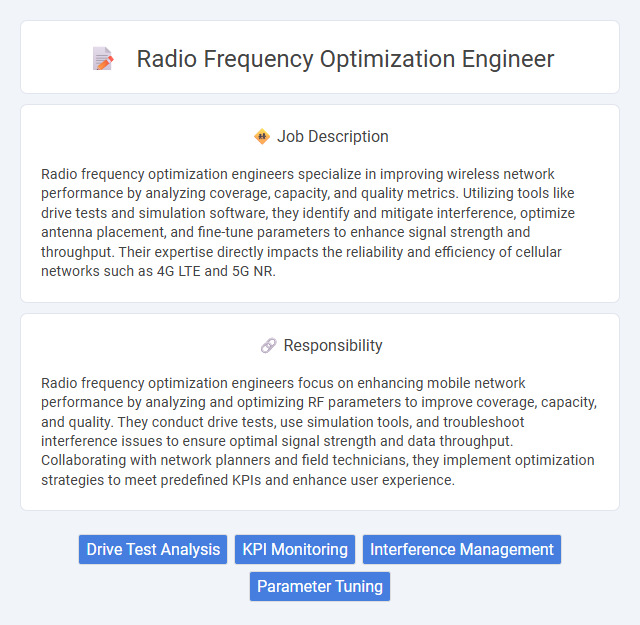
Radio frequency optimization engineers specialize in improving wireless network performance by analyzing coverage, capacity, and quality metrics. Utilizing tools like drive tests and simulation software, they identify and mitigate interference, optimize antenna placement, and fine-tune parameters to enhance signal strength and throughput. Their expertise directly impacts the reliability and efficiency of cellular networks such as 4G LTE and 5G NR.
Individuals with strong analytical skills and a passion for technology may find a career as a Radio Frequency Optimization Engineer to be well-suited for their abilities. Those who enjoy problem-solving, working with complex data, and optimizing wireless networks could likely thrive in this role. However, candidates who prefer less technical tasks or minimal collaboration might find the demands of this job challenging.
Qualification
A Radio Frequency Optimization Engineer typically requires a bachelor's degree in telecommunications, electrical engineering, or a related field, combined with practical experience in wireless network performance analysis and optimization. Proficiency in RF propagation modeling, drive testing tools, and network optimization software such as TEMS, Atoll, or Mentum is essential. Strong analytical skills and knowledge of 3G, 4G LTE, and 5G technologies, along with effective communication abilities, are critical qualifications for success in this role.
Responsibility
Radio frequency optimization engineers focus on enhancing mobile network performance by analyzing and optimizing RF parameters to improve coverage, capacity, and quality. They conduct drive tests, use simulation tools, and troubleshoot interference issues to ensure optimal signal strength and data throughput. Collaborating with network planners and field technicians, they implement optimization strategies to meet predefined KPIs and enhance user experience.
Benefit
Radio frequency optimization engineers likely benefit from enhanced network performance, resulting in improved signal quality and user experience. They probably experience opportunities for career growth due to the critical role they play in telecommunication infrastructure. This job may also offer exposure to advanced technologies and a dynamic work environment.
Challenge
The role of a Radio Frequency Optimization Engineer likely involves continuously addressing complex signal interference and network congestion issues. They probably face the challenge of optimizing coverage and capacity in diverse and evolving environments, which requires advanced analytical skills and the ability to adapt to new technologies rapidly. Managing trade-offs between performance improvements and cost constraints could be a significant part of their daily responsibilities.
Career Advancement
Radio frequency optimization engineers enhance wireless network performance through data analysis, signal testing, and parameter tuning, enabling faster career progression into senior technical roles or network strategy positions. Mastery of tools such as ATOLL, TEMS, and MATLAB, combined with certifications like CWNP or Cisco CCNA Wireless, significantly boosts promotion prospects. Leadership skills and cross-functional collaboration often lead to managerial roles or specialization in emerging 5G and 6G technologies.
Key Terms
Drive Test Analysis
A Radio Frequency Optimization Engineer specializing in Drive Test Analysis conducts field measurements to collect data on signal strength, coverage, and quality across various geographical locations. They utilize advanced software tools to analyze KPIs such as RSRP, RSRQ, and SINR, identifying network performance issues and interference sources. Their insights guide network tuning, parameter adjustments, and optimization strategies to enhance user experience and maximize cellular network efficiency.
KPI Monitoring
Radio frequency optimization engineers are responsible for monitoring key performance indicators (KPIs) such as signal strength, data throughput, and call drop rates to enhance network quality. They analyze real-time data from network elements to identify coverage gaps and interference issues, enabling precise tuning of radio parameters. Continuous KPI monitoring supports proactive optimization strategies that improve user experience and network capacity.
Interference Management
A Radio Frequency Optimization Engineer specializing in interference management analyzes and mitigates signal disturbances to enhance network quality and capacity. Utilizing advanced tools and algorithms, they identify sources of interference such as co-channel and adjacent channel noise, optimizing frequency allocation and power levels. Their expertise ensures improved signal clarity, reduced dropped calls, and maximized spectral efficiency in wireless communication systems.
Parameter Tuning
Radio frequency optimization engineers specialize in parameter tuning to enhance wireless network performance by adjusting key variables such as transmit power, antenna tilt, and handover thresholds. They analyze network data using advanced algorithms and drive improvements in coverage, capacity, and quality of service. Precision in parameter tuning directly impacts interference reduction and overall user experience in LTE, 5G, and other cellular technologies.
 kuljobs.com
kuljobs.com